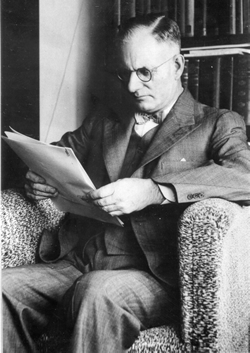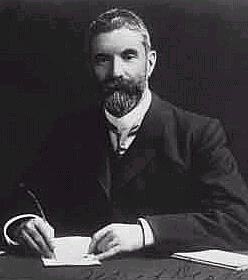Is it possible to imagine an Australian prime minister in love with literature? Someone for whom poetry could have just as much appeal as politics? A political leader who is not only a keen and discerning reader but also a highly accomplished writer? Hardly! (I hear you cry) – not in our own time, anyway.
While it’s true that Tony Abbott is credited with four books and was once a journalist, even his most enthusiastic supporters probably wouldn’t claim that he’s a literary luminary. But things were sometimes different in earlier periods.
As a schoolboy I borrowed one of the volumes of Winston Churchill’s History of the English-Speaking Peoples from the library, and found it absorbing. I knew, of course, that he’d been Britain’s wartime Prime Minister, and a powerful orator. Only later did I learn that he’d written many other books – more than 30, including a novel – and was awarded the Nobel Prize for Literature while in office as his nation’s leader.
I’d like to read Jonathan Rose’s recent book The Literary Churchill: Author, Reader, Actor (Yale University Press), reviewed by Peter Clarke here. I gather that Rose traces a range of literary influences on Churchill’s publications and carefully crafted speeches, arguing that much of what the great British leader had read became transmuted so creatively through his own writings that it exerted an enormous influence even beyond his own country. ‘Sometimes’, Rose remarks, ‘the lives of millions depend on what their rulers read.’
Churchill isn’t a lone example. Nearer to our own time there’s Vaclav Havel (1936-2011): not only a distinguished playwright, public intellectual, humanitarian advocate and recipient of many international awards, but also the last President of Czechoslovakia and first President of the Czech Republic. Then there’s the Peruvian writer, journalist, literary critic and politician Mario Vargas Llosa: born in the same year as Havel, Llosa ran for the presidency of Peru in 1990 (unsuccessfully) and received the Nobel Prize for Literature 20 years later. He is best known for his novels, including The War of the End of the World and The Feast of the Goat.
So what about Australian politicians who were not only highly literate but also actively literary in their interests and pursuits? Well, there are two shining examples, but we have to go back many years to find them. They are the only two PMs who – fittingly – have had universities in this country named after them: John Curtin (1885-1945) and Alfred Deakin (1856-1919).
Curtin’s lifelong immersion in poetry was the subject of an illuminating public lecture that I attended recently in Perth, held under the aegis of the John Curtin Prime Ministerial Library (JCPML). You can read the text of it here. The lecturer was Curtin’s great grandson Dr Toby Davidson, a poet and academic. I’d previously known a bit about Curtin’s literary interests – e.g. that before he entered parliament he was already an energetic journalist, lecturer, editor, book reviewer and orator, and that as the member for Fremantle during most of the period 1928-45 his prowess as a writer and speaker grew steadily. (My novel That Untravelled World makes brief mention of his rousing radio speeches during the Great Depression.) But I learnt a lot more from Toby Davidson’s lecture.
Davidson demonstrated cogently that Curtin committed to memory a wide range of poetry over many years, and continued to draw inspiration from it throughout his career, even while leading the nation through the anxious years of World War 2. ‘Every man should read poetry – for the good of his soul’, he said in an interview on becoming PM in 1941. It was fascinating to be shown by Davidson how extensively Curtin annotated his well-thumbed copy of a translation of Dante’s Inferno, commenting in the margins on its applicability to politics and everyday morality – or to see how he quoted lines from Swinburne and O’Dowd to frame his most momentous wartime broadcasts to the Australian people.
Alfred Deakin was even more thoroughly literary. Though one of Australia’s most successful politicians, he confessed in a personal letter ‘My heart is always in the highlands of literature.’ Late in life he wrote that ‘the intoxication of public success’ could not compare with ‘the transports I receive from books’ and that he had ‘lived more, & more intensely, in & through books’.
In an article on ‘The Literary Statesman: Alfred Deakin and his Papers’, Graeme Powell emphasises the wide range of Deakin’s reading, which included not only English writers (e.g. Shakespeare, Meredith, Hardy, Shaw, Twain, James, Kipling, Conrad and Bennett) but also French (e.g. Rousseau, Balzac, Sand, Maupassant and Daudet) and many more in translation, such as Cervantes, Goethe, Dostoevsky and various Greek and Latin classics.
Deakin’s diaries show that he read on average about 100 books a year, despite a huge weight of daily political chores. But extensive reading was not his only activity in ‘the highlands of literature.’ He also authored several book-length works, covering diverse subjects including literary criticism, spiritual allegory and political history; he filled manuscript notebooks with creative compositions in several genres from verse drama to poetry; and he contributed many articles, often under a pseudonym, to newspapers and journals. He was also a prolific letter writer, one of his most enduring correspondents being Walter Murdoch, essayist and professor of English.
There’s an odd omission in Powell’s article on this ‘literary statesman’: it makes no reference to Deakin’s lifelong admiration of Wordsworth, the predominant figure in his literary pantheon. (In that regard he wasn’t alone among political leaders; for instance Deakin’s contemporary Woodrow Wilson, the US President, used to read Wordsworth’s poems to his family at the end of a day, and quoted them in print to support his views about the study of literature.) Deakin’s devotion to Wordsworth’s poems was steadfast over the course of many years. He continued to re-read them, transcribing some into a notebook, including others in an anthology he edited, adopting Wordsworthian blank verse for compositions of his own, consulting many articles on the poet’s work, and writing (with continual revisions) his own very long essay on ‘The Gospel according to Wordsworth.’ I refer to these matters in my book on Wordsworth.
Deakin’s love of literature had tangible benefits for the nation that he led. Most notably, he did much to promote literary activity in Australia, both through generous personal encouragement of individual writers and through his role in establishing the Commonwealth Literary Fund – the first systematic federal government initiative in support of the arts.
Today’s politicians may seem utterly different. But Havel died only three years ago and Llosa is still alive. Perhaps it’s possible that a highly literate and actively literary political leader could yet emerge influentially in our country in our time. Sometimes, as Rose reminds us, the lives of millions can depend on what their rulers read. So if, as a start, you could choose half a dozen literary works to put in the in-tray of a 21st-century Australian PM, what would they be?

